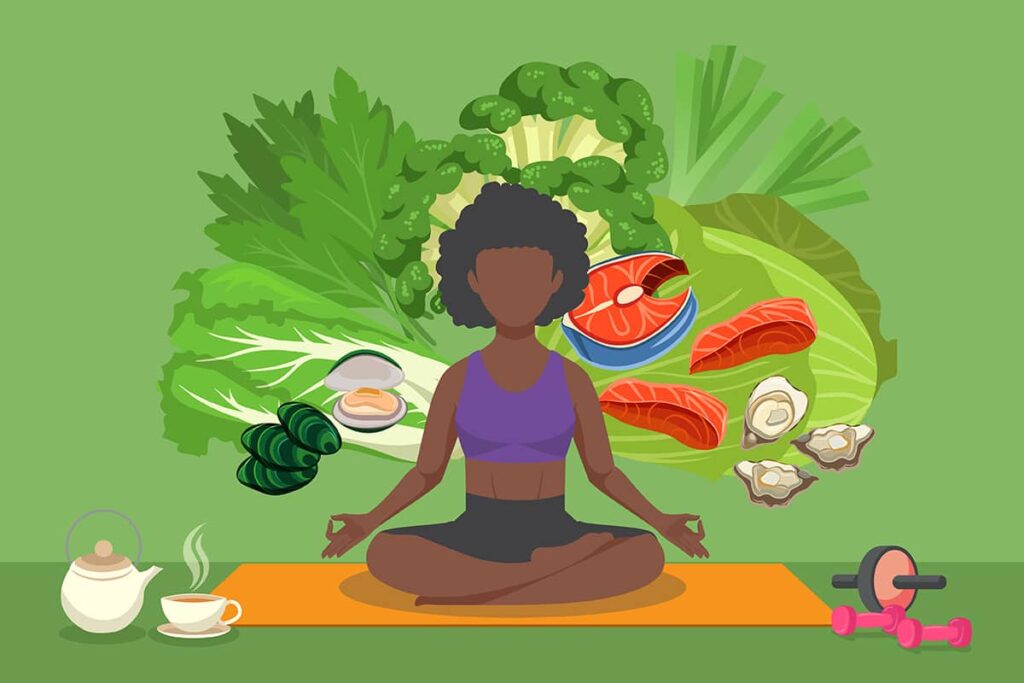Depression is one of the most common mental health disorders in the United States. It is estimated that around 16 million adults suffer from depression each year. While antidepressant medications can be effective for some people, they can also come with a lot of side effects. For this reason, many people are looking for natural antidepressants to help alleviate their symptoms. In this blog post, we will discuss 22 natural antidepressants that are effective for treating depression!
Contents
Defining Depression
Depression is more than just feeling sad or down. It is a real medical condition that can cause physical, emotional, and behavioral problems. People with depression may have trouble sleeping, eating, and also concentrating. They may also feel hopeless, guilty, or worthless. It can be very difficult to function when you are dealing with depression.
Defining Antidepressants
Antidepressants are medications that are used to treat depression. They can come in the form of pills, liquids, or injections. Antidepressants work by changing the levels of certain chemicals in the brain. These chemicals are called neurotransmitters and they play a role in mood and emotion.
There are many different types of antidepressants available, and they all work differently. Some common side effects of antidepressants include weight gain, sexual dysfunction, and dry mouth. It is important to talk to your doctor about any potential side effects before starting antidepressant medication.
Natural Antidepressants
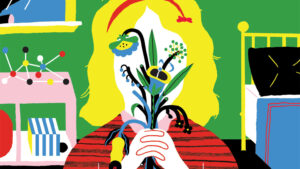
Natural antidepressants are any substances that can help alleviate depression symptoms without causing serious side effects.
Many different natural antidepressants are effective in treating depression. Some of the most popular options include:
St. John’s Wort
This herb has been used for centuries to treat a variety of mental health conditions, including depression. It is thought to work by increasing levels of serotonin in the brain. This also helps to improve sleep, appetite, and energy levels, which are major signs of depression.
Kava Kava
This is an herb that has traditionally been used to treat anxiety and stress. It is thought to work by reducing neurotransmitter activity in the brain. This can help to improve mood and alleviate some of the symptoms of depression.
Ginkgo biloba
This herb has been used for centuries in traditional Chinese medicine. It is thought to improve blood circulation and reduce inflammation. Ginkgo biloba is effective in treating symptoms of depression.
Passionflower
This herb is commonly used to treat anxiety and insomnia. It is thought to work by further reducing levels of stress hormones in the body. Passionflower can also help to improve sleep quality, which can be beneficial for people with depression.
Valerian root
This herb has traditionally been used to treat anxiety and insomnia. It is thought to work by increasing levels of GABA in the brain. This can help to improve mood and reduce some of the symptoms of depression.
Omega-three fatty acids
These are found in fish oil and be effective in treating depression. They are thought to work by reducing inflammation and improving brain function. It eases depression by raising levels of serotonin and dopamine.
Zinc
Zinc is a mineral that is essential for proper brain function. It is effective in treating depression. Zinc deficiency has been linked to an increased risk of depression.
Creatine
Creatine is an amino acid that is found in meat and fish. It is thought to improve brain function and energy levels. Creatine has been shown to be effective in treating symptoms of depression.
Vitamin B12
Vitamin B12 is an essential nutrient that helps the body make red blood cells and DNA. It also helps to keep the nervous system functioning properly. Vitamin B12 deficiency has been linked to an increased risk of depression.
L-theanine
This is an amino acid that is found in green tea. It is thought to improve mood and reduce anxiety. L-theanine has been shown to be effective in treating symptoms of depression.
Folate
This is a vitamin that is found in leafy green vegetables, legumes, nuts, and seeds. It helps to produce DNA and RNA, which are essential for brain function. Folate has been shown to be effective in treating depression by improving brain function.
Magnesium
Magnesium is a mineral that is involved in over 300 biochemical reactions in the body. It has been shown to be effective in treating depression by improving sleep and reducing anxiety.
Probiotics
Probiotics are live bacteria that are found in yogurt and other fermented foods. They have been shown to be effective in treating depression by improving gut health and reducing inflammation. They also help in depression by affecting the way you think and how your brain responds to stress.
Vitamin D
Vitamin D is an essential nutrient that helps the body absorb calcium. It is also thought to play a role in brain function and has been linked to a lower risk of depression.
Saffron
Saffron is a spice that has been used for centuries in traditional medicine. It is thought to work by increasing levels of serotonin and dopamine in the brain. This can help to improve mood and alleviate depression symptoms.
Chamomile
This herb has traditionally been used to treat anxiety and insomnia. Chamomile is thought to work by reducing inflammation and improving neurotransmitter activity in the brain. This can help to improve mood and further improve depressive moods and symptoms.
Lavender
Lavender is a popular essential oil that has a variety of uses. It is thought to work by reducing anxiety and improving sleep. This can moreover help to alleviate some of the symptoms of depression. It is important to note that essential oils should not be ingested.
SAM-e
SAM-e is a compound that is found naturally in the body. It is involved in the production of neurotransmitters such as serotonin, dopamine, and norepinephrine, and is effective in treating depression. This can help to improve mood and improve depression symptoms This is a compound that is found naturally in the body.
Acupuncture
This ancient Chinese practice has been shown to be effective in treating a variety of mental health conditions, including depression. It is thought to work by stimulating the release of endorphins, which are natural mood-boosters.
Aromatherapy
This practice involves using essential oils to promote relaxation and improve mood. Some studies have found that aromatherapy can be effective in treating symptoms of depression. It involves the use of essential oils to stimulate the sense of smell, which can help to improve mood and also help with depression symptoms.
While these are some of the most popular natural antidepressants, there are many other options available. If you are interested in trying a natural antidepressant, talk to your doctor to see if it is right for you. Depression is a serious condition that should not be taken lightly. If you are struggling with depression, please seek professional help!
Benefits Of Natural Antidepressants
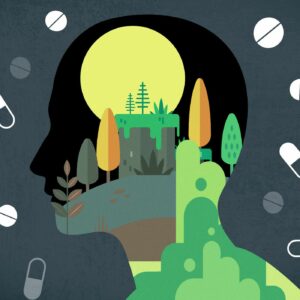
There are many benefits of natural antidepressants. Some of the most common benefits include improvements such as:
- Reducing stress
- Improving sleep
- Reducing anxiety
- Improving gut health
- Reducing inflammation
- Affecting the way you think
- Improving brain function
- Linked to a lower risk of depression
- Increasing levels of serotonin and dopamine in the brain
- Improving sleep
- Reducing inflammation and improving neurotransmitter activity in the brain
- Releasing endorphins into the body
In addition to the obvious benefits on the body and mind, these supplements also have a significance on the fact that they are affordable, as well as locally available in comparison to prescription drugs.
Drawbacks Of Natural Antidepressants
There are a few potential drawbacks of natural antidepressants. These include:
- People may have unidentified allergic reactions, which can further get severe if left without supervision.
- Some natural antidepressants may not be as effective as prescription medications.
- They may have side effects, such as upset stomach or headaches.
- They may interact with other medications you are taking.
Be sure to talk to your doctor before starting any new medication, natural or otherwise. Depression is a serious condition that should not be taken lightly. It can have further life-altering impacts on one’s physical as well as mental health.
Natural antidepressants can provide some relief from mild to moderate depression symptoms without the use of prescription medication. However, they are not meant to replace professional medical care for those with severe depression. If you think you might be suffering from depression, please speak to your doctor.
Alternative Treatments
There are many alternative treatments for depression that can be effective. Some of the most popular include:
Therapy
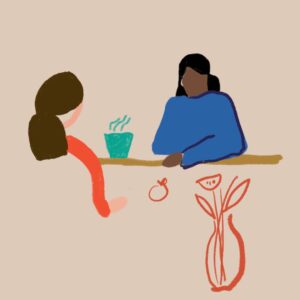
Therapy for depression can take many different forms, but all aim to help you understand and manage your depression. Therapeutic intervention works by helping you to identify negative thoughts and behaviors and replace them with more positive ones. Some of the most common and effective approaches to therapy for treating depression include:
- Cognitive-behavioral therapy: This type of therapy helps you to identify and further change negative thinking patterns.
- Interpersonal therapy: This type of therapy focuses on your relationships and how they may be affecting your depression. It is highly structured as well as time bound in nature.
- Psychodynamic therapy: This type of therapy explores the role of past experiences in your current depression. This approach works by making clients further understand their emotions and condition, as well as helping in better decision-making.
- Family therapy: This type of therapy can help to improve communication and also resolve conflict within your family.
- Expressive Arts Therapy: This type of therapy uses art to express your feelings and thoughts. It involves both the creative process and the therapist’s interpretation of your artwork. Other forms of art that find their use in this type of therapy include music, dance, books as well as drama
- Animal-assisted therapy: This type of therapy uses animals to help you relax and feel more comfortable. It can involve interacting with a pet such as dogs, cats, bunnies, or working with service animals.
- Hypnotherapy: This type of therapy uses hypnosis to help you change negative thinking patterns and behaviors by accessing the subconscious mind.
Your respective psychologist/therapist may use either one or a combination of the given techniques of therapy, depending upon your symptoms and preferences.
Medication
Medication for depression can be very effective for some people. The most common types of medication used to treat depression include examples such as:
- Selective serotonin reuptake inhibitors (SSRIs): These medications help to increase levels of serotonin in the brain.
- Serotonin and norepinephrine reuptake inhibitors (SNRIs): These medications help to increase levels of both serotonin and norepinephrine in the brain.
- Tricyclic antidepressants (TCAs): These medications work by inhibiting the reuptake of norepinephrine and serotonin in the brain.
- Monoamine oxidase inhibitors (MAOIs): These medications work by inhibiting the breakdown of monoamines in the brain.
It is essential to speak with your doctor before starting any medication for depression. This is because antidepressants can have serious side effects and need to be closely monitored.
Exercise
Exercise has a number of benefits for mental health. It is thought to work by reducing stress and improving relaxation. Exercise has been shown to be effective in treating depression by further reducing rumination. It can also help to improve sleep and reduce stress. Some forms of exercise that are particularly effective in treating depression include:
- Aerobic exercise: This type of exercise helps to increase heart rate and breathing. It includes activities such as walking, running, and swimming.
- Mindfulness-based exercises: These exercises help you to focus on the present moment and be more aware of your thoughts and feelings. They can include activities such as yoga, Tai Chi, and meditation.
- Resistance training: This type of exercise helps to build muscle strength. It includes activities such as weightlifting and Pilates.
- Stretching: This type of exercise helps to improve flexibility. It includes activities such as yoga and Tai Chi.
You can choose any type of exercise depending upon your preference, interest, as well as time availability. You can also choose to start doing these by yourself, or join an in-person or virtual class if you want to seek further company.
Lifestyle Changes
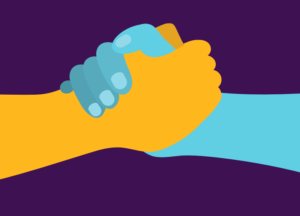
There are a number of lifestyle changes that can help to reduce the symptoms of depression. These include activities such as:
- Eating a balanced diet: Eating a healthy diet can help to improve mood and energy levels.
- Reducing alcohol intake: Alcohol is a depressant and can make symptoms worse. reducing alcohol intake can help to improve mood and also reduce stress levels.
- Quitting smoking: Smoking has been shown to worsen depression symptoms. quitting smoking can help to improve mood and overall health.
- Getting enough sleep: Sleep plays an important role in mental health. Getting enough sleep can help to reduce fatigue and also improve concentration.
- Managing stress: Stress can further worsen the symptoms of depression. Learning how to manage stress can help to reduce the symptoms of depression.
- Limiting screen time: Research has shown that too much time spent on screens can increase the risk of depression.
- Spending time in nature: Spending time in nature has been shown to reduce stress and anxiety.
- Connecting with others: Social support is important for mental health. Moreover, connecting with others can help to reduce isolation and improve mood.
Each person is different, so what works for one person may not work for another. It’s important to find what works best for you and also to talk to your doctor about any alternative treatments you are considering. Depression is a serious condition that should not be taken lightly. If you are struggling with depression, please seek further professional help!
Conclusion
If you are struggling with depression, it is important to talk to your doctor about treatment options. There are a variety of effective treatments available, and the best option for you will depend on your individual situation. Don’t hesitate to reach out for help if you need it.
Depression is a serious condition, but it is treatable. You don’t have to suffer silently. There is hope and there is help available. Seek out the resources that can help you get on the road to recovery today.
For more information, please contact MantraCare. Depression is a mental illness characterized by persistent feelings of sadness, hopelessness, and loss of interest in daily activities. If you have any queries regarding Online Depression Counseling experienced therapists at MantraCare can help: Book a trial Depression Therapy session
